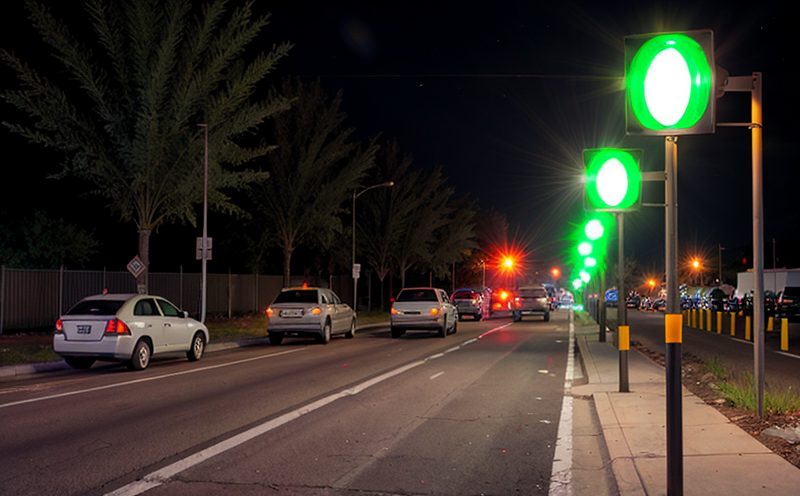IEC 60068 2 30 Damp Heat Testing of Traffic Signal Systems
The IEC 60068-2-30 standard, commonly known as the "Damp Heat Test," is a critical procedure used to evaluate the durability and reliability of electrical and electronic components in harsh environmental conditions. This test simulates the effects of high humidity combined with elevated temperatures on traffic signal systems, ensuring that they can withstand these challenging environments without failure.
Traffic signal systems are exposed to various environmental stresses during their operational lifecycle. These include exposure to moisture, rain, fog, and other elements. The IEC 60068-2-30 test is specifically designed to mimic the conditions that traffic signals might encounter in tropical or humid climates where prolonged exposure to high humidity and elevated temperatures can affect the performance of these systems.
The test procedure involves subjecting the traffic signal system to a combination of high temperature and relative humidity. This exposure simulates real-world conditions, ensuring that the system remains functional even under adverse environmental circumstances. The testing process is designed to identify potential weaknesses in the design or manufacturing process that could lead to failures during actual use.
The test typically follows these steps:
- Preparation of the specimen: Ensure that all components and assemblies are properly installed and connected.
- Environmental conditioning: Place the specimen in a chamber maintained at specific temperature and humidity levels.
- Exposure period: Maintain the specified conditions for the required duration, usually 48 hours.
- Evaluation: Inspect the specimen after exposure to determine any changes or failures.
The purpose of this test is not just to ensure compliance with standards but also to enhance product reliability and durability. By subjecting traffic signal systems to these controlled environmental conditions, manufacturers can identify potential issues early in the development process, allowing for necessary improvements before products reach the market.
Failure to meet the requirements of IEC 60068-2-30 can lead to significant operational disruptions and increased maintenance costs. Reliable traffic signal systems are essential for ensuring smooth traffic flow and public safety. Compliance with this standard helps manufacturers provide products that are not only compliant but also robust and dependable under real-world conditions.
At Eurolab, we have extensive experience in conducting IEC 60068-2-30 tests on traffic signal systems. Our state-of-the-art facilities ensure precise control over environmental parameters, providing accurate and reliable test results. Our team of experts ensures that each test is conducted in accordance with the latest standards and best practices.
Why It Matters
The reliability of traffic signal systems directly impacts public safety and operational efficiency. Ensuring that these systems meet stringent environmental testing requirements, such as IEC 60068-2-30, is crucial for several reasons:
- Safety: Reliable signals reduce the risk of accidents caused by malfunctions due to exposure to harsh environments.
- Efficiency: Unreliable systems can lead to traffic congestion and increased fuel consumption. Compliance with this standard helps maintain optimal performance.
- Economic Benefits: Reduced maintenance costs and longer lifespan of the system translate into significant savings for municipalities.
- Compliance: Meeting international standards ensures that products are accepted in various markets around the world, facilitating global trade.
In summary, IEC 60068-2-30 testing is essential for ensuring that traffic signal systems can withstand challenging environmental conditions, thereby enhancing safety and operational efficiency while maintaining compliance with international standards.
Applied Standards
The International Electrotechnical Commission (IEC) 60068-2-30 standard is widely recognized for its rigorous approach to evaluating the durability of electrical and electronic components under damp heat conditions. This standard specifies the procedure for conducting a damp heat test, which simulates environmental conditions that can affect the performance of traffic signal systems.
The test aims to assess the resistance of materials and assemblies to moisture and high temperatures by subjecting them to controlled environments. The specific parameters include:
- Temperature: Typically set between 40°C and 50°C, depending on the application.
- Relative Humidity: Maintained at around 93% RH for the duration of the test.
- Duration: Usually lasts for 48 hours to ensure sufficient exposure time.
The standard also provides guidelines for preparing specimens before testing, ensuring accurate and consistent results. Compliance with IEC 60068-2-30 is crucial not only for product reliability but also for meeting regulatory requirements in various regions.
At Eurolab, we adhere strictly to these standards during our testing processes, ensuring that the results are reliable and can be trusted by manufacturers and regulatory bodies alike. Our commitment to quality and precision guarantees that each test conducted is accurate and representative of real-world conditions.
Eurolab Advantages
At Eurolab, we pride ourselves on providing comprehensive testing solutions tailored specifically for your needs. When it comes to IEC 60068-2-30 damp heat testing of traffic signal systems, our advantages include:
- State-of-the-Art Facilities: Our advanced laboratories are equipped with the latest technology and equipment to ensure precise control over environmental parameters.
- Expertise: Our team comprises highly skilled professionals who have extensive experience in conducting these types of tests. They stay updated on the latest industry trends and developments.
- Rigorous Quality Control: We maintain strict quality control measures to ensure that all tests are conducted accurately and consistently.
- Comprehensive Reporting: Our detailed reports provide insights into both pass/fail results as well as any issues identified during the testing process. This information is invaluable for continuous improvement efforts.
- Global Recognition: By adhering to international standards like IEC 60068-2-30, we ensure that our tests are recognized and accepted worldwide, facilitating smoother market entry for your products.
- Custom Solutions: We offer customized testing solutions based on specific project requirements, ensuring comprehensive coverage of all necessary aspects.
Partnering with Eurolab ensures not only compliance but also enhanced product reliability and performance. Contact us today to discuss how we can assist you in meeting your testing needs.





